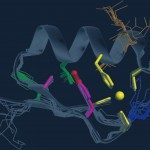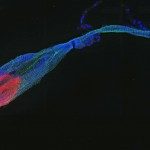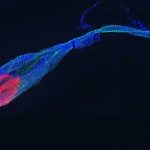Lien vers Pubmed [PMID] – 17766391
Protein Sci. 2007 Sep;16(9):2013-22
The link between the NF-kappaB signal transduction pathway and cancer is now well established. Inhibiting this pathway is therefore a promising approach in the treatment of certain cancers through a pro-apoptotic effect in malignant cells. Owing to its central role in the pathway, the IkappaB kinase (IKK) complex is a privileged target for designing inhibitors. Previously, we showed that oligomerization of NEMO is necessary for IKK activation and defined a minimal oligomerization domain (CC2-LZ) for NEMO, and we developed NEMO peptides inhibiting NF-kappaB activation at the level of the IKK complex. To improve the low-affinity inhibitors, we used ribosome display to select small and stable proteins with high affinity against the individual CC2-LZ because the entire NEMO protein is poorly soluble. Several binders with affinities in the low nanomolar range were obtained. When expressed in human cells, some of the selected molecules, despite their partial degradation, inhibited TNF-alpha-mediated NF-kappaB activation while having no effect on the basal activity. Controls with a naive library member or null plasmid had no effect. Furthermore, we could show that this NF-kappaB inhibition occurs through a specific interaction between the binders and the endogenous NEMO, resulting in decreased IKK activation. These results indicate that in vitro selections with the NEMO subdomain alone as a target may be sufficient to lead to interesting compounds that are able to inhibit NF-kappaB activation.




